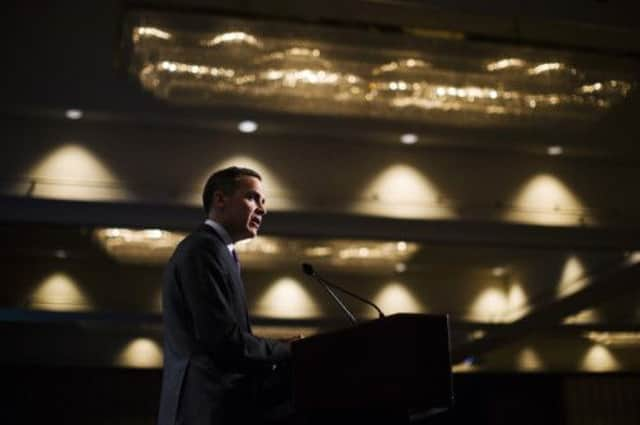RBS: Carney ‘troubled’ by firm to collapse claims


During a sometimes-tetchy session in front of the Treasury select committee, Mark Carney said a report on RBS’s actions, compiled by Business Secretary Vince Cable’s adviser Lawrence Tomlinson, was “extremely serious”.
He told MPs: “It is the direct responsibility of the Financial Conduct Authority to conduct an appropriate investigation. This has to be tracked down to the fullest extent of the law.”
Advertisement
Hide AdAdvertisement
Hide AdTomlinson’s report alleges that state-backed RBS forced companies into financial distress to buy their assets at rock-bottom prices. RBS, led by new chief executive Ross McEwan, has hired law firm Clifford Chance to look into the allegation, which were described as “shocking” by George Osborne.
The Chancellor yesterday wrote to Carney to say the Bank of England should consider whether its financial policy committee (FPC) needs extra powers to force lenders to hold more capital to protect them against loans going bad. Osborne said: “Now is an appropriate time for the FPC to consider whether and when it needs any additional powers of direction over the leverage ratio.”
Carney agreed that leverage ratios – which measure the amount of capital banks hold as a percentage of their loans – were a “vital component” in assessing the strength of lenders, but said pressure on banks to rebuild their balance sheets was no excuse for the “predatory restructuring” of small firms.
The former head of Canada’s central bank said: “If I were to choose just one reason why Canadian banks fared as well as they did through the crisis, it would be because they were subject to a leverage standard.”
Patrick Fell, financial services director at accounts PwC, said: “Leverage is a tool that will bite for many. Banks need to accept that their world will change as a result and adapt their strategies and businesses for the new environment.”
Carney also mounted a robust defence of his forward guidance strategy, which pledges to keep interest rates at their record low of 0.5 per cent until unemployment falls to 7 per cent.
The Bank’s latest forecast brought forward the date at which that threshold was likely to be reached by nine months, and Conservative MP suggested this had damaged the central bank’s credibility, leaving forward guidance “dead on arrival”. Carney replied: “That is a total failure of logic.”
The central bank will be in no hurry to raise borrowing costs when unemployment hits its target, Carney said, adding: “Seven per cent is a threshold, not a trigger.”
Advertisement
Hide AdAdvertisement
Hide AdHe was also challenged over his assessment of the country’s economic health, with Labour’s John Mann accusing him of using “selective” figures to paint a “rosier” picture, and suggesting he was too close to the Chancellor.
“I am more than mildly offended by the thrust of the question,” Carney said.
The governor, who took over from Lord King at the helm of the Bank in July, said the Office for National Statistics needed to improve how it presents official figures on business investment and levels of debt, adding that he was “a lot more comfortable with the data in Canada”.